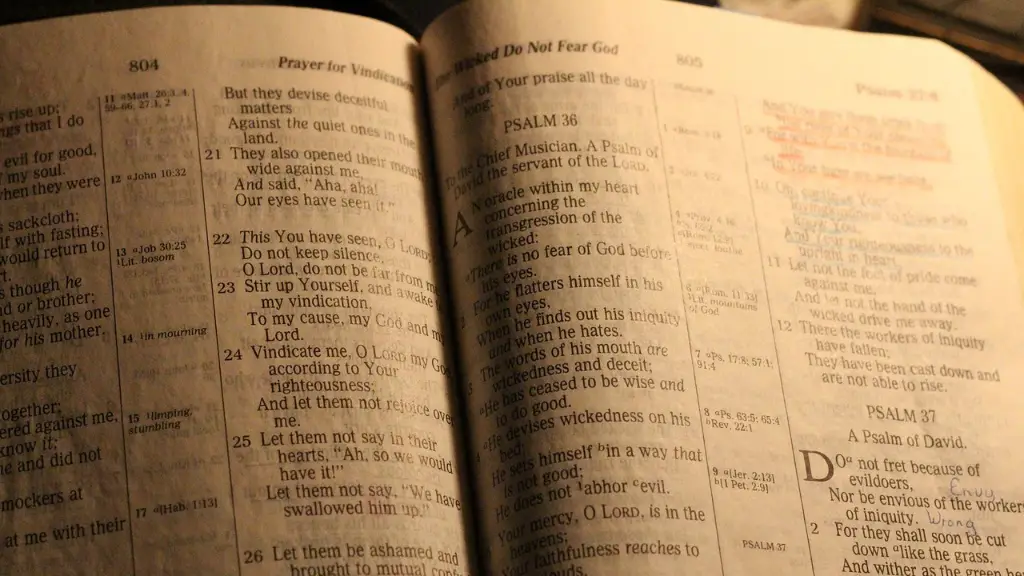The Bible story of Abel is a deeply moving one. Abel was the son of Adam and Eve, the first humans, who were created by God. He was the younger son of the couple, born after the birth of his older brother, Cain. Abel is remembered for the tragic ending of his life, as he became the first human ever to be killed, with his death serving as a cautionary tale of two brothers doomed by jealousy and hatred.
From the outset, God took a special interest in Abel. As the younger brother, he was viewed as the more obedient of the two and was favored with God’s approval and acceptance. This made Cain jealous, and his ever-growing envy eventually led to the murder of Abel, the first recorded case of fratricide in the Bible.
Theologians believe that Abel’s death is an example of what can happen when envy and hatred take over someone’s heart. It is a powerful lesson in how destructive emotions can be, as well as a chilling reminder that everyone’s life is precious, no matter their age or circumstances.
Abel’s life is also symbolic of humankind’s relationship with God. Unlike mankind, Abel chose to be obedient to God and have faith in Him. This faith and obedience made him God’s champion and set him apart from the disobedient Cain. Abel’s obedience is considered a striking example of faith and courage, a model of true loyalty to God.
In some respects, Abel’s life and death also coincided with the rise of the guilt sentencing system. During the trial of Cain, God declared that anyone who commits a crime and is found guilty, will be punished with a sentence. This is the first recorded case in which a person was punished for an act of violence.
Biblical scholars consider Abel’s story to be a powerful reminder of the vengeance of God and how He will judge mankind with justice and fairness. Additionally, Abel’s death also serves as a warning for all of us to heed; it is a reminder to stay humble and obedient to God, and a lesson of the consequences of hatred, envy, and murder.
The Cursing of Cain
The Bible also reveals the aftermath of Abel’s death. After finding out his brother had been killed, God cursed Cain to a life of ceaseless roaming, full of fear and despair. God declared, “A fugitive and a wanderer you will be in the earth”. This punishment, although harsh, was seen as a fitting retribution for his sinister deed, and set an example of how wrongdoings will not be tolerated by God.
Cain’s punishment, however, was not the end of the story. Even after his terrible deed, God showed his mercy and ultimate justice. He placed a mark of protection on Cain and declared that whoever should kill the murderer, would be punished sevenfold. To many, this signified the essential idea of justice – that the law should protect even the guilty, so that innocent bystanders would not have to suffer.
What Abel’s Story Means To Us
Abel’s story serves as a reminder to us of the importance of faith, loyalty and obedience to God. It also emphasizes the importance of justice, mercy and ultimately, faithfulness. Even after Cain’s heinous deed, God showed mercy and justice, by placing a mark of protection on the murderer and punishing any would-be killer.
Abel’s story provides us with a number of teachable moments. It teaches us to be constantly aware of our own flaws, while also having the courage to act humbly and faithfully. Lastly, it teaches us to take responsibility for our deeds and to live with the understanding that justice will always be served in one way or another.
The Legacy of Abel
Abel’s legacy lives on in our culture, language and art. Many books, films, and plays have been written about the story of Abel, bringing its timeless lessons to life for a new generation. In popular culture, Abel’s courage, loyalty and devotion to God has been an inspiration for believers and non-believers alike. His story is a reminder of the danger of envy and hatred, but also of the beauty and power of faith and obedience to God.
The legacy of Abel is also found in our language, with the term “Abelian” used to denote anything related to devoted faith and obedience. This term is attributed to Abel’s example of faithful service to God and his willingness to suffer the consequences of his obedience.
The Meaning Behind Abel’s Name
Abel’s name holds deep significance in the Bible. It is believed that Abel derived his name from the Hebrew word “hebel” which means “breath”, or “vapor”. This symbolic name is thought to capture Abel’s short life and his status as the first human to die.
Additionally, Abel’s name is used as a metaphor for the fragility and transience of life. The phrase “Abel’s life” is seen to represent all people’s mortality. Many use it as a reminder to appreciate life and to have faith in God and His grace, just as Abel did.
Abel in Christianity
Abel is an important figure in Christianity for a number of reasons. He is seen as a symbol of true faith and obedience to God, which is one of the core teachings of Christianity. Additionally, Abel is also seen as a representation of the difficulties and struggles faced by those who are obedient to God’s will and faith. This is seen in the notion of Abel being killed by his jealous and envious brother, yet still remaining faithful to God until the end.
Abel is also seen as a symbol of hope. As a result of his courageous faith and example of complete obedience, Abel was granted heavenly rewards by God. Churchgoers cherish the memory of Abel and strive to emulate his unwavering faith and obedience. This serves to bring hope to mankind, and a reminder of the joy and peace that awaits us in the afterlife if we continue to faithfully serve God.
Conclusion
The story of Abel is one of tragedy and resilience, and a reminder of the power of faith, obedience and justice. Abel’s story serves as a warning for all of us to heed, a reminder to stay humble and stay obedient to God. His legacy continues to influence art, language, and faith even to this day. Although the story of Abel is sad, it remains a powerful reminder of the beauty and power of faith and the importance of justice and mercy.



